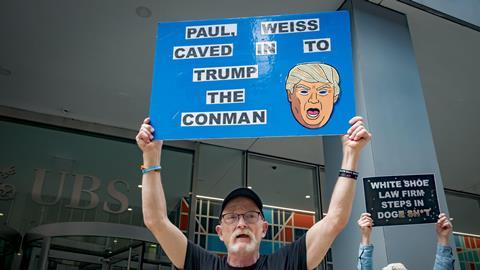We contacted all the top 25 firms to find out
Top City law firms generally have plump corporate PR departments, often staffed by former journalists attracted by the decent salaries and perks on offer. But they have been underemployed in responding to president Trump’s full-spectrum assault on Big Law. Some are proving uncharacteristically coy when quizzed by the Gazette on the notable dearth of information concerning the diversity of this year’s new partner appointments, for example. Careless talk can cost money, it seems, for firms that do business on both sides of the Atlantic.
Still, all we can do is ask. So the Gazette conducted a survey of all the top 25 firms by revenue, asking them formally what, if any, changes they have made to their diversity, equity and inclusion (DEI) policies in the past six months. We also asked whether any aspects of those policies have come under review since Trump was voted back into office on 5 November.
Fourteen firms responded. All affirmed their commitment to DEI policies – though with varying levels of detail about what that commitment now entails. Seven said there had been no change in the past six months and that there is no ongoing review. Three said there has been no change but that reviews take place regularly; and two firms merely stated their ongoing support for DEI, without disclosing whether there has been any change.
[Simmons & Simmons] is committed to ensuring opportunities for all, irrespective of background. Having a range of diverse perspectives and experiences across the business is essential, and we will continue to support this through our policies
Simmons & Simmons
One firm, Simmons & Simmons, said it has changed its DEI policy – but only to beef up its commitment.
Three of the firms approached have received letters from a US federal agency demanding that they demonstrate they are acting lawfully on recruitment. The only one of those to respond was Freshfields. It stated that, while its DEI targets outside the US remain unchanged, it has ‘retired’ its US targets.
Big Law was thrown into an existential crisis when Trump signed an executive order restricting one of the country’s biggest law firms – Paul, Weiss, Rifkind, Wharton & Garrison LLP – from government work. The executive order was withdrawn only when the firm ditched its DEI policies and pledged the equivalent of $40m (£31m) in pro bono legal services over the next four years to support the Trump administration’s justice initiatives.

The White House has ramped up the pressure on DEI since the president signed an order on his first day in office directing federal agencies to terminate all ‘equity-related’ grants or contracts. Leading law firms were ordered to show they are not discriminating through their DEI policies. The federal government’s US Equal Employment Opportunity Commission (EEOC) wrote to 20 firms requesting information about equality practices.
One firm asked to show it was acting lawfully on recruitment was international firm White & Case, which last month confirmed it had discontinued its diversity and inclusion (D&I) function. In its place will be an initiative focused on ‘professional skills training and engagement’.
Law firms now face the realistic prospect of having their ability to work in the US suspended if they do not toe the Trump line on DEI. That has not stopped Big Law from facing fierce criticism for failing to circle the wagons against Trump amid the persecution of Paul, Weiss. It seems that any firm which takes a stand on DEI must be prepared to go out on a limb.

So what did the firms actually tell us?
Freshfields stated that, while its DEI targets outside the US have not changed, ‘our US targets have all been met or are currently exceeded, so those have now been retired’. The firm’s responsible business report for 2024 explains how, in 2021, it launched five-year global commitments to D&I, setting targets for gender, race and ethnicity, and LGBTQ+ representation. Targets included new partners (international promotions and lateral hires) being at least 40% women, 40% men, and 20% men, women or non-binary by 2026 (i.e. never more than 60% of one gender).

Freshfields declined to comment further on whether the retired US targets could return at some point, or whether new targets will be set.
Freshfields was one of the 20 firms contacted in March by the EEOC, which said it had concerns that some firms’ DEI practices may entail unlawful treatments based on race, sex or other protected characteristics in violation of the Civil Rights Act of 1964. The firm remained noticeably unforthcoming on any diversity considerations that may have been involved in the appointments of new partners announced in April. In 2023, announcing 30 new partners, Freshfields included representation statistics for gender and race/ethnicity. These data are absent from the 2024 press release on the new partners, which remains on the firm’s website, and are absent again this year, when Freshfields elevated 25 to partner globally.
Earlier last month, it emerged that Freshfields had altered the heading on its main DEI website page from ‘diversity and inclusion’ to ‘culture and inclusion’.
Simmons & Simmons disclosed that, while the firm made changes in February through the implementation of new UK targets, these enhanced the firm’s DEI policy goals. ‘Ambitious’ social mobility targets anticipate a minimum of 20% of partners, managing associates, associates and trainees/apprentices being from lower socio-economic backgrounds by 2029.
The international firm stressed that it is one of only a few large law firms to publicly disclose its targets. A spokesperson said: ‘The firm is committed to ensuring opportunities for all, irrespective of background. Having a range of diverse perspectives and experiences across the business is essential, and we will continue to support this through our policies.’
It is business as usual on DEI for Eversheds Sutherland, Slaughter and May, Addleshaw Goddard, Osborne Clarke, Norton Rose Fulbright, Taylor Wessing*, Fieldfisher and Pinsent Masons. None of these firms has made any changes in the past six months, nor are they reviewing their policies.
Pinsent Masons has appointed its first director of DEI and talent and, in April, announced that half of its promotions to the partnership this year were women. A spokesperson said: ‘We remain firmly committed to our DEI principles and to ensuring equity of opportunity is at the core of our efforts in providing a fair workplace for all.’
While stating no change had been made to their policies, CMS, Kennedys and DWF Law all pointed out that they regularly review all their policies, including DEI. DWF’s current D&I strategy runs through to 2025, so the firm will be reviewing future plans this year. Kennedys reviews all policies on a yearly basis, while CMS regularly reviews all policies, the Gazette understands.
DWF said in a statement: ‘We continue to see the benefit of creating an inclusive and equitable working environment, because it fosters the diverse talent that drives our success.’
Herbert Smith Freehills did not directly answer the question of whether there has been any change over the period, but a spokesperson said: ‘We remain committed to our high-performing culture of respect, belonging and inclusion. We regularly assess our programmes to ensure they support our vision, they are impactful and evidenced-based, are guided by the best interests of our people, clients and firm, and are consistent with our values.’
Similarly, Bird & Bird did not directly state there had been no change, but insisted the firm ‘stands by its values of fairness and equality and remains committed to its D&I strategy’. Hogan Lovells – another of the 20 firms written to by the EEOC – declined to comment.
The firms which did not respond to the Gazette survey were DLA Piper, Clifford Chance, A&O Shearman, Linklaters, Ashurst, Clyde & Co, BCLP, Womble Bond Dickinson and DAC Beachcroft.
A&O Shearman was also on the EEOC’s list. Last month Trump announced that the firm – along with Kirkland & Ellis, Simpson Thacher & Bartlett, and Latham & Watkins – had cut a deal to provide $125m in pro bono legal services. Posting on his Truth Social website, the president said: ‘The law firms affirm their commitment to merit-based hiring, promotion, and retention. Accordingly, the law firms will not engage in illegal DEI discrimination and preferences. The law firms affirm that it is their policy to give fair and equal consideration to job candidates, irrespective of their political beliefs, including candidates who have served in the Trump administration, and any other Republican or Democrat administration.’
Last month, A&O Shearman said it had promoted 33 to the partnership, but made no mention of diversity. That was in stark contrast to its partner promotions announcement last year. Ahead of Allen & Overy’s merger with Shearman & Sterling, Khalid Garousha, senior partner, hailed the fact that 42% of new partners promoted in 2024 across both firms were women.
In 2020 Allen & Overy announced a diversity push to ensure 15% of the partnership was from an ethnic minority by 2025. The firm also set a target of having at least a quarter of its lawyers and support staff recruited from diverse backgrounds by the same date, and committed to recruiting 35% of its trainees from ethnic minorities. It has not commented on whether these targets were met.
* After this article went to press a spokesperson for Taylor Wessing responded: 'We believe in an inclusive working environment which offers equal opportunities for all and regularly review our policies and procedures to ensure we are delivering against that ambition.' The firm has just published its latest Responsible Business report, which contains data on the ethnicity and gender of partners and staff.
This article is now closed for comment.
































7 Readers' comments